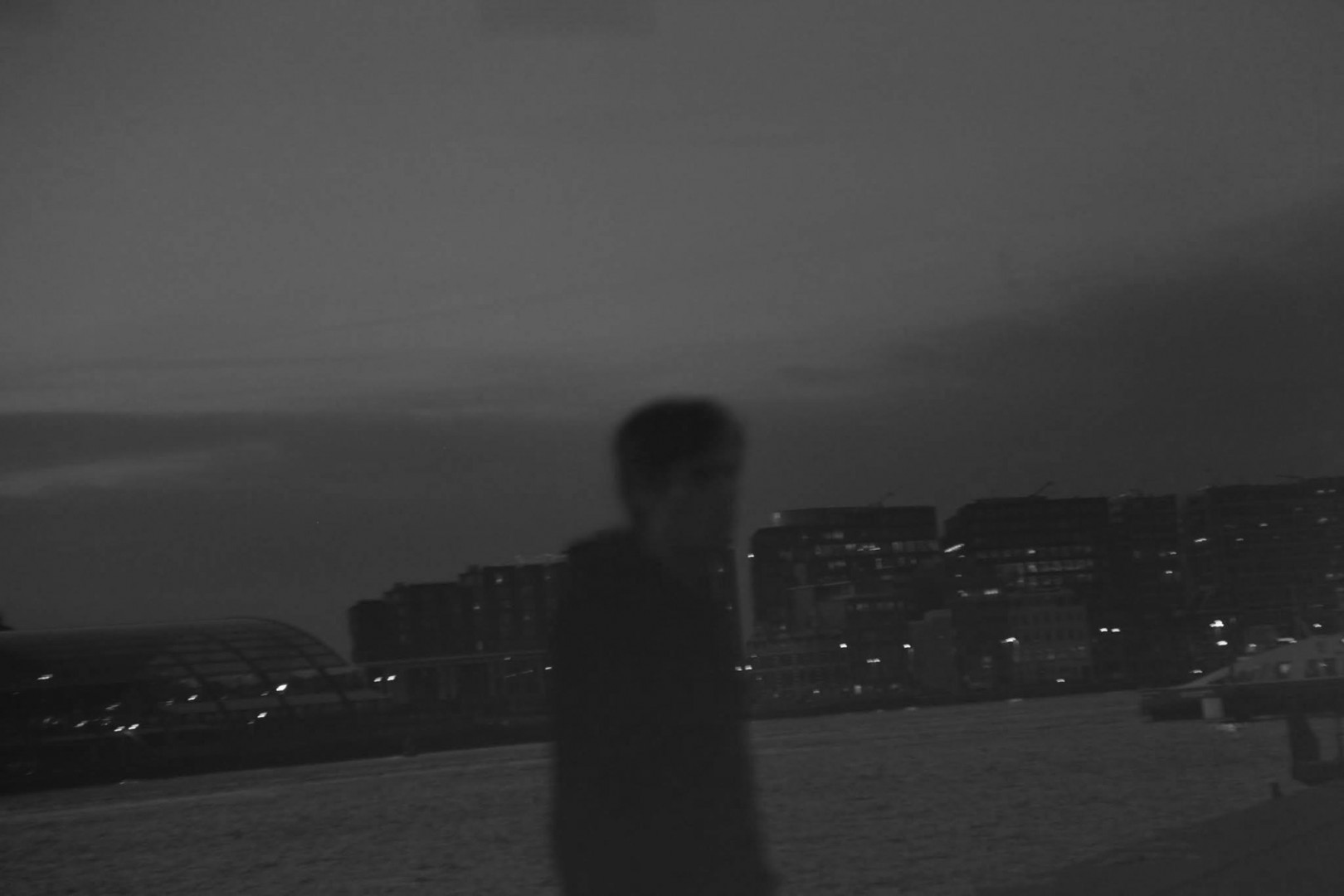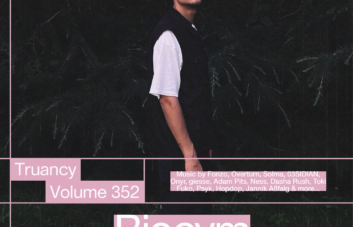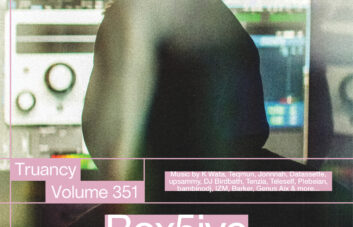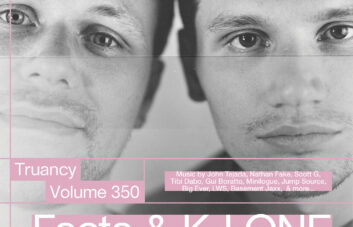Minor Science’s discography is, if not yet overwhelming in volume, then certainly impressive in it’s quality. A pair of releases on Will Bankhead’s The Trilogy Tapes and Nic Tasker’s Whities labels are stylistically broad but can be typified by an arresting combination of weirdness balanced with effectiveness as dance music, as well as arresting details which have one returning to the tracks over and over (you can detect a similar meticulous, considered approach in his writing about music – Angus Finlayson is a staff writer and critic at Resident Advisor). For our 142nd Truancy Volume, Minor Science has recorded a mix that shows his impressive abilities as a selector in a somewhat different light to what one may have previously identified with him – rhythmically propulsive and eclectic techno, electro and house with that crucial element of experimentation and sense of fun. He also spoke to us about the background behind his interest in music, his approach to writing tracks, and shared some thoughts on music criticism.
How did you start making electronic music – was there a particular inspiration, or were you perhaps involved with music beforehand? “I was in a very earnest band through my teenage years. Dance music started to take over after my older brother, who was also in the band, went to university and began to discover things like dubstep and Planet Mu. I also studied music at university, in London. I did three quarters of a composition degree, and I suppose it was natural that I would gravitate towards electronic production, where you can have control over every aspect of the process. (I was in another band whilst studying, but that stopped a few years ago.) The social aspect of it also appealed to me. Even though people moan about how the golden age is over, the sense of shared endeavour in dance music is still quite strong. In, say, guitar music, pockets of interesting music are much more dispersed and the economics of it are terrible. That’s to say nothing of the ‘contemporary classical’ scene I was exposed to at uni, which is a small group of people making music for an audience which doesn’t exist.”
You were active on the music forum Dissensus for some time, and I recall the boards having quite an active subsection where people would share their productions and give feedback to each other – did you take part in that and did it have any role in how you wrote (or write) music? “Yeah, I spent a lot of time on Dissensus for a while — I guess it must be almost five years ago now — but I didn’t really go on the production bit so much. I think my interests did mirror that of other Dissensus producers though — I’m thinking of people like Batu — in that my main gateway into dance music was dubstep, and at that time I was following the scene which came out of dubstep, around labels like Hessle Audio. I used to listen to Ben UFO on Rinse pretty religiously, and would send him the dodgy demos I was making at the time. He’s since been very supportive, and had a hand in each of my first two singles coming out. So thanks Ben!”
How did your work with Will Bankhead’s The Trilogy Tapes and Nic Tasker’s Whities come about? “Both got in touch with me out of the blue asking to hear music for possible release. Will had heard ‘Hapless’ on Ben’s show. Neither of them really had a relationship with me as a journalist, which appealed to me. It’s obviously inevitable that the two roles will blur together sometimes, but it’s not something I’m very comfortable with. Nic has since become a sounding board for all sorts of creative decisions, and I’m very happy to be doing a second record with him. He takes the long view on an artist’s career, and places a huge premium on originality — both things which I value a lot.”
If I am not wrong, the first music that you released was “Train Window Girl” – a collection of tracks in which you reworked the music of Scott Walker. That was quite an interesting project, and in comparison to your subsequent output, the sound there tended towards ambient or drone. Did you first pick the palette with which you wanted to work and Walker’s happened to music fit into that framework – for example, or did you set out to work with his music and so the source material was itself what primarily defined the sonic direction you took? Are you planning on doing anything in a similar vein in the future? “Yeah that’s the first thing I put out under the Minor Science name (and by ‘put out’ I mean ‘uploaded to Sendspace’). I’d been trying to make dance tracks under other names for a while before that though. Originally I thought Minor Science would be my ‘not-dance-music’ project. Then I realised that I couldn’t think of any other passable names, and that the techniques which I’d played with on that release became more central to my dance stuff in any case. It’s funny you ask about ‘sonic direction’ versus ‘source material’. The name Minor Science was taken from Deleuze and Guattari (pretty embarrassing I know, I did one year of a cultural studies degree and it took me a long time to recover). I can’t remember the quote now, and wouldn’t claim to have ever fully understood D+G. But the vague idea is that, whereas a ‘royal’ science develops a universal theory and imposes it top-down on the things it describes, a ‘minor’ science works upwards from the particularities of the things themselves. This chimed with what excites me about working with a sample, which is that it has peculiar qualities which immediately suggest certain ways of working. In other words, ‘source material’ dictates ‘sonic direction’. I’ve since made a few non-dance tracks on the same principle, one of which I played on Debonair’s NTS show. The plan is to do a release at some point, but it’s been years and I still can’t decide what form it should take.”
Across the two releases on The Trilogy Tapes and Whities – as well as (and perhaps especially) your forthcoming record on the latter, your tracks often have quite a few small but important details which make them particularly interesting and suited for repeated listening. How do you typically approach writing your tracks (for example over an extended period of time, building up layers of sound)? “I think the main challenge in producing electronic music on your own is psychological. You don’t need technique to make good music this way — plenty of incredible tracks have been made with rudimentary skills and equipment. What you do need is the ability to see past your own blindspots and insecurities, in order to clearly understand what’s valuable and what isn’t in the sounds you’re making. And I suppose to work out what, if anything, you have to say that nobody else is saying. I routinely hit a kind of block with this, which is partly why I release music so slowly. It can lead to quite a convoluted production process, as I sort of circle the plughole of finishing a track waiting for the right moment to slip through. There’s definitely a lot of reworking, layering, and transferring sounds and ideas from one song project to another — particularly recently. ‘Hapless’ took about four hours to make and the B side from the new record took many times that.”
Prior to moving to Berlin you lived in Amsterdam. In your experience, what are the differences between the two when it comes to (dance & electronic )music – in terms of community/culture as well as infrastructure factors? “I only lived there for a year, during which I was skint and pretty much only hung out with people from the UK, so I don’t have an authoritative opinion on Amsterdam. It’s a beautiful place, and for such a small city it definitely punches above its weight culturally. At the same time it has the limitations of any smaller city. When I lived there, Trouw reigned supreme, and I wasn’t always super enthusiastic about the music policy or the atmosphere there. Berlin has more world-class clubs than most countries in their entirety, and the majority of interesting musicians pass through at some point. I also just know more people here, which helps my sanity.”
Your mix for us is somewhat different from several other Minor Science mixes (such as the excellent Blowing Up the Workshop one), in being what could be said more “dance-floor oriented”. Is this a reflection of you DJing more often now? “The BUTW mix is a very specific sort of thing, and though I plan to make a sequel, I hope nobody expects me to do something like that in a club! I tried it once and it was a disaster. I realise it’s confusing though, that being the only proper mix of mine around. I’ve considered myself some sort of a club DJ for years, but until recently a reluctant one. Part of this was working out what format I was comfortable with: I was introduced to DJing by vinyl lovers, but the cost and space issues are prohibitive for me, and I’ve since learnt to stop worrying and love the USB stick. It was also, again, about having something to say. I was a producer first, and for a long time I was skeptical about whether I had anything worthwhile to contribute as a DJ. You see so many producers put out a couple of good records and then barrel round the circuit because they can. I hope I’m now in a place where I won’t just be adding to the noise.”
Do you have to compartmentalise your consumption of or approach to music depending on whether it’s for the purpose of writing about it or for DJing/making music? “My week is split about 50/50 between my writing work and my music-making. This is obviously a cushy life arrangement for which I feel stupidly lucky (it wouldn’t be financially possible anywhere other than Berlin). But yeah, the compartmentalising can be tricky. I definitely listen differently depending on which hat I’m wearing. There’s reams of stuff which I love as a critic (and by extension as a fan) but would never DJ with or ‘bring into contact’ with my own music. I guess I’m limiting myself, but it feels necessary in order to keep the two worlds separate. Particularly with regards to looking for tracks to play out, I’m listening for something very specific (though I couldn’t really explain what that is). In general I think finding a musical identity now is less about what you acquire and more about what you discard. Everyone with broadband is swamped with music. Maybe my situation is a bit more extreme than most though.”
You have been writing about music professionally for several years now. How do you view (the purpose of) your role as a critic, and the place that music criticism has now in general? Has there been a marked change in this sphere of writing that you have noticed? “Hmm. How long have you got? In the age of user reviews, streaming services and dying print media, it’s difficult to justify art criticism by pretty much any metric. (And by criticism I mean the sort of writing which can be both positive or negative about its subject. The stuff which is always positive, on the grounds that bad art isn’t worth writing about, can be great, but it isn’t really me). There was an entertaining Nathan Heller piece about this in the New Yorker recently. It starts off by demolishing all the usual defences of criticism, and eventually reaches this sort of vague conclusion which, in any case, he says only applies to print writing. I couldn’t do any better. I suppose the only thing I would say is that, in this respect at least, dance music criticism is a lot like dance music. To the people who get something from it its value is self-evident. Any justification you serve up to the non-believers — I’ve been seeing ‘night-time economy’ used as a justification of clubs recently — will always kind of miss the point. The difference of course is that art is noble and great whereas criticism is a cheap thing done by failed musicians. Or so I’ve heard.”
Tracklist:
Vakula – Identification [Bandura]
The Maghreban – Afric [Zoot]
∑ – Objectness [Unterton]
Mosca – White Mice [Not So Much]
Marcel Dettmann – Radio [MDR]
Bintus ft. Sensational – You In The Right Spot [Power Vacuum] Sandman – Machines Like This [Take The Elevator]
Nukubus – Skylark (Dub) [SD Records]
Levon Vincent – Late Night Jam [Ostgut Ton]
Oni Ayhun – OAR004-A [OAR]
Lurka – Partials [Black Acre]
Physical Therapy – Hit The Breaks (Bonus Beats) [Liberation Technologies]
Sherwood – Burnin’ Beats [Ruff Definition]
I:Cube – Makossa Suspense (Pilooski Edit) [Versatile]
Randomer – Juju [L.I.E.S.]
Don Froth – Live Notes [WNCL]
Photo credit: Jemima Yong




